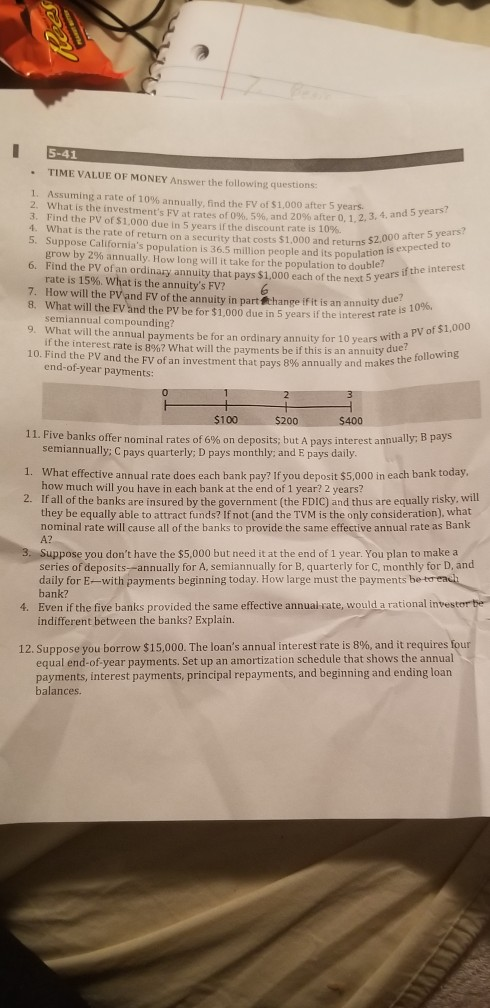Answered step by step
Verified Expert Solution
Question
1 Approved Answer
Need help with problems 9, 10, 11.1, 11.2, 11.3, 11.4 and 12. Please show work . Thank you so much 5-41 TIME VALUE OF MONEY

Need help with problems 9, 10, 11.1, 11.2, 11.3, 11.4 and 12. Please show work . Thank you so much
5-41 TIME VALUE OF MONEY Answer the following questions 1. Assuming a rate of 10% annually, find the FV of$1,000 after 5years 2, what is the investment's FV at rates of 0%, 5%, and 20% after 0.1, 2, 3, Find the PV of $1,000 due in 5 years if the discount rate is 10%. and 5 years? 4 5. Suppose California's population is 36.5 million people and its population 6. Find the PV of an ordinary annuity that pays $1,000 each of the next 5 years and returns $2,000 after 5 years? is expected to rate is 15%, what is the annuity's FV? 6 How will the PVand FV of the annuity in part change if it is an annuity semiannual compounding? if the interest rate is 8%? what will the payments be if this is an annuitydwhe following end-of-year payments: 7. 8. What will the FV and the PV be for $1,000 due in 5 years if the interest 9. What will the annual payments be for an ordinary annuity for 10 years 10. Find the PV and the FV of an investment that pays 8% annually and m rate is 10%, 0 years with a PV of $1,000 akes t $100 $200 $400 11. F ive banks offer nominal rates of 6% on deposits; but A pays interest annually, B pays semiannually; C pays quarterly: D pays monthly: and E pays daily. 1. What effective annual rate does each bank pay? If you deposit $5,000 in each bank today 2. If all of the banks are insured by the government (the FDIC) and thus are equally risky, wil how much will you have in each bank at the end of 1 year? 2 years? they be equally able to attract funds? If not (and the TVM is the only consideration), what nominal rate will cause all of the banks to provide the same effective annual rate as Bank 42 uppose you don't have the $5,000 but need it at the end of 1 year. You plan to make a series of deposits--annually for A, semiannually for B, quarterly for C, monthly for D, and daily for E-with payments beginning today. How large must the payments bank? 4. Even if the five banks provided the same effective annual rate, would a rational investorte indifferent between the banks? Explain. 12. Suppose you borrow $15,000. The loan's annual interest rate is 8%, and it requires equal end-of year payments. Set up an amortization schedule that shows the annual payments, interest payments, principal repayments, and beginning and ending lo balancesStep by Step Solution
There are 3 Steps involved in it
Step: 1

Get Instant Access to Expert-Tailored Solutions
See step-by-step solutions with expert insights and AI powered tools for academic success
Step: 2

Step: 3

Ace Your Homework with AI
Get the answers you need in no time with our AI-driven, step-by-step assistance
Get Started


